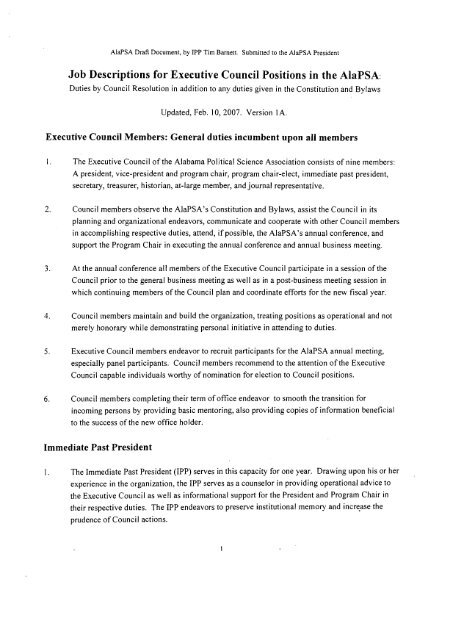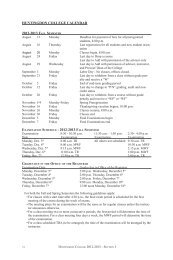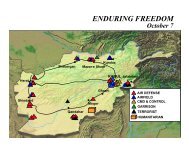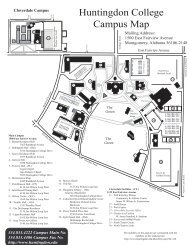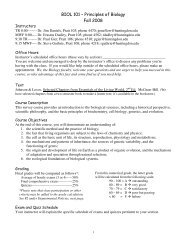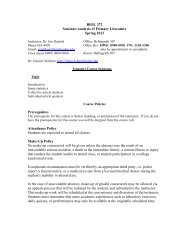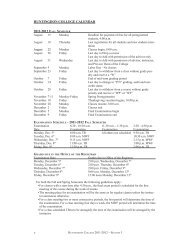Job Descriptions of Executive Council Positions
Job Descriptions of Executive Council Positions
Job Descriptions of Executive Council Positions
You also want an ePaper? Increase the reach of your titles
YUMPU automatically turns print PDFs into web optimized ePapers that Google loves.
AlaPSA Draft Document, by IPP Tim Barnett. Submitted to the AlaPSA President<br />
<strong>Job</strong> <strong>Descriptions</strong> for <strong>Executive</strong> <strong>Council</strong> <strong>Positions</strong> in the AlaPSA:<br />
Duties by <strong>Council</strong> Resolution in addition to any duties given in the Constitution and Bylaws<br />
Updated, Feb. 10,2007. Version lA.<br />
<strong>Executive</strong> <strong>Council</strong> Members: General duties incumbent upon all members<br />
I. The <strong>Executive</strong> <strong>Council</strong> <strong>of</strong> the Alabama Political Science Association consists <strong>of</strong> nine members:<br />
A president, vice-president and program chair, program chair-elect, immediate past president,<br />
secretary, treasurer, historian, at-large member, and journal representative.<br />
2. <strong>Council</strong> members observe the AlaPSA's Constitution and Bylaws, assist the <strong>Council</strong> in its<br />
planning and organizational endeavors, communicate and cooperate with other <strong>Council</strong> members<br />
in accomplishing respective duties, attend, if possible, the AlaPSA's annual conference, and<br />
support the Program Chair in executing the annual conference and annual business meeting.<br />
3. At the annual conference all members <strong>of</strong>the <strong>Executive</strong> <strong>Council</strong> participate in a session <strong>of</strong> the<br />
<strong>Council</strong> prior to the general business meeting as well as in a post-business meeting session in<br />
which continuing members <strong>of</strong>the <strong>Council</strong> plan and coordinate efforts for the new fiscal year.<br />
4. <strong>Council</strong> members maintain and build the organization, treating positions as operational and not<br />
merely honorary while demonstrating personal initiative in attending to duties.<br />
5. <strong>Executive</strong> <strong>Council</strong> members endeavor to recruit participants for the AlaPSA annual meeting,<br />
especially panel participants. <strong>Council</strong> members recommend to the attention <strong>of</strong>the <strong>Executive</strong><br />
<strong>Council</strong> capable individuals worthy <strong>of</strong> nomination for election to <strong>Council</strong> positions.<br />
6. <strong>Council</strong> members completing their term <strong>of</strong> <strong>of</strong>fice endeavor to smooth the transition for<br />
incoming persons by providing basic mentoring, also providing copies <strong>of</strong> information beneficial<br />
to the success <strong>of</strong> the new <strong>of</strong>fice holder.<br />
Immediate Past President<br />
1. The Immediate Past President (IPP) serves in this capacity for one year. Drawing upon his or her<br />
experience in the organization, the IPP serves as a counselor in providing operational advice to<br />
the <strong>Executive</strong> <strong>Council</strong> as well as informational support for the President and Program Chair in<br />
their respective duties. The IPP endeavors to preserve institutional memory and increase the<br />
prudence <strong>of</strong>Co unci I actions.
2. The Immediate Past President is responsible for the management <strong>of</strong> the organization if the<br />
President fails to act or is temporarily unable to provide administration. If the Program Chair is<br />
unable to plan the annual meeting adequately, the IPP assists the President in taking remedial<br />
actions, assisted by the At-Large member. If the <strong>Executive</strong> <strong>Council</strong> receives a resignation from a<br />
<strong>Council</strong> member, the IPP assists the President in securing a solution.<br />
3. The Immediate Past President serves as an ombudsman in helping the <strong>Executive</strong> <strong>Council</strong> resolve<br />
any interpersonal issues between <strong>Council</strong> members that affect the work <strong>of</strong> the organization. In<br />
this capacity the IPP asks, 'What is best for the organization's long-term interests and mission '?<br />
4. At the President's request, the Immediate Past President assists the President in fund raising<br />
endeavors or grant writing. The IPP also provides support to the President in other key matters<br />
<strong>of</strong> organizational development.<br />
AlaPSA President<br />
I. The AlaPSA President administers the organization and manages the <strong>Executive</strong> <strong>Council</strong> in a<br />
participatory fashion, performing whatever duties are appropriate in light <strong>of</strong> the organization's<br />
Constitution and Bylaws. The president plans and presides over <strong>Executive</strong> <strong>Council</strong> meetings,<br />
AlaPSA business meetings, and AlaPSA elections during his or her term, providing to<br />
participants a written agenda <strong>of</strong> items for consideration at such meetings.<br />
2. The President remains in direct contact with the <strong>Executive</strong> <strong>Council</strong> and in direct or indirect<br />
communication with AlaPSA members and the broader AlaPSA constituency, util izing the<br />
Program Chair or Secretary in matters where cooperation enhances communication success.<br />
3. The President is the organization's visionary leader, seeking out ways to strengthen the AlaPSA<br />
through means such as project planning, grant writing, programs for graduate students, good<br />
publicity, and the cultivation <strong>of</strong> institutional support. The President provides a "President's<br />
Report" to the <strong>Council</strong> informing <strong>Council</strong> members about accomplishments during the most<br />
recent term and imparting ideas and recommendations for the future benefit <strong>of</strong>the organization.<br />
4. The President annually reviews the organization's financial records as supplied by the AlaPSA<br />
Treasurer, endeavoring to verify that organizational finances are sound. If remedial action is<br />
prudent in financial matters, the President works with the <strong>Council</strong> in effecting the change.<br />
5. The President mentors the Vice-President as the Vice-President prepares for the President's role.<br />
The outgoing President passes the AlaPSA gavel to the incoming President near the close <strong>of</strong> the<br />
annual business meeting, providing the incoming President the opportunity to welcome new<br />
<strong>Council</strong> members and make a statement regarding plans for the new fiscal year.<br />
2
Vice-President and Program Chair<br />
1. In accordance with the AlaPSA Constitution and Bylaws, the Vice-President serves as the<br />
Program Chair for the annual business meeting, planning, announcing, and implementing all<br />
aspects <strong>of</strong> the meeting in a fashion sufficient to insure its success. The Program Chair completes<br />
these duties in consultation with the President, Secretary, and Treasurer.<br />
2. The Program Chair plans the annual conference <strong>of</strong>the AlaPSA so as to provide intellectually<br />
stimulating panels, roundtables, and special speaker events. The AlaPSA holds a two day<br />
conference on a Friday and Saturday in the month <strong>of</strong> March, the cost traditionally subsidized (in<br />
part) by the political science department at the institution where the event is held. The Program<br />
Chair in consultation with the President and Treasurer sets registrant fees for the annual meeting,<br />
bearing in mind the amount <strong>of</strong> financial resources available and the traditional costs borne by<br />
participants in AlaPSA events. The AlaPSA President retains control <strong>of</strong> any decision that draws<br />
down the financial resources <strong>of</strong> the organization for a conference or other AlaPSA event.<br />
3. A typical annual meeting will have panels for faculty papers, panels for graduate student papers<br />
(research as well as expository or exploratory), and roundtable panels by which distinguished<br />
members <strong>of</strong>the academic community can interact on topics important to Alabama politics,<br />
government administration and public policy. A social reception, Friday dinner with a keynote<br />
speaker, and Saturday luncheon are typical elements <strong>of</strong> a conference, hopefully buttressed with<br />
entertainment or opportunities for social interaction. The Program Chair is responsible to plan<br />
and implement events along this order and make provision for <strong>Council</strong> and business meetings.<br />
4. The Program Chair consults with the Treasurer in developing a plan for collections and<br />
disbursements pertaining to the annual conference, the plan sufficiently flexible to accommodate<br />
the circumstances <strong>of</strong> the host institution. The Program Chair works with the Secretary to<br />
publicize news <strong>of</strong>the annual conference and to increase participation in panels and events.<br />
5. The AlaPSA Vice-President and Program Chair receives the organization gavel near the end <strong>of</strong><br />
the annual business meeting, becoming at that point the new AlaPSA President. As such, the<br />
new President is responsible for the balance <strong>of</strong> the business meeting and the session <strong>of</strong> the<br />
<strong>Executive</strong> <strong>Council</strong> that follows the close <strong>of</strong> the business meeting.<br />
6. The Program Chair mentors the Program Chair-Elect to insure that sufficient understanding <strong>of</strong><br />
Program Chair operations is transmitted to the person responsible for the annual m~eting the<br />
following year.<br />
, 3
Program Chair-Elect<br />
I. The Program Chair-Elect serves in an apprentice capacity with the duty <strong>of</strong> learning about the<br />
organization, developing pr<strong>of</strong>essional relationships with <strong>Executive</strong> <strong>Council</strong> members, and<br />
starting the planning process for the annual conference during his or her term as Program Chair.<br />
2. The Program Chair-Eject communicates to the President in a timely fashion any considerations<br />
that could affect the prospects for the annual meeting during his or her term as Program Chair.<br />
Secretary<br />
I. The Secretary facilitates communication within the <strong>Executive</strong> <strong>Council</strong> and ensures the adequacy<br />
<strong>of</strong>AlaPSA communication to members as well as general constituents (e.g., past members,<br />
prospective members, and interested persons) where appropriate. The Secretary makes a record<br />
<strong>of</strong> all <strong>of</strong>ficial communications and documents <strong>of</strong>the organization, distributing information to<br />
<strong>Council</strong> members and to the Historian for archiving. The Secretary is the primary recorder <strong>of</strong><br />
meeting minutes, conferring with the Historian and President regarding matters needing<br />
clarification. The Secretary supplies the President with a timely copy <strong>of</strong> all meeting minutes.<br />
2. The Secretary oversees the AlaPSA website, managing it directly or overseeing its administration<br />
by another person selected for the task. The Secretary ensures that website information is<br />
current, with pertinent information updated at least quarterly as noted on the site. Also, the<br />
Secretary in consultation with other <strong>Council</strong> members finds ways to improve the website, making<br />
it a useful vehicle <strong>of</strong> organizational visibility, communication and new member recruitment.<br />
Each year the Secretary provides the American Political Science Association (APSA) with<br />
updated information concerning the AlaPSA (the APSA publishing such data on its website).<br />
3. The Secretary ensures that AlaPSA members receive an organizational update bye-mail on a<br />
quarterly basis and that members are properly informed concerning the annual conference, calls<br />
for papers or panels, registration information, election and special event notification, <strong>Executive</strong><br />
<strong>Council</strong> decisions affecting members, and the outcome <strong>of</strong> <strong>Council</strong> elections. Also, the Secretary<br />
works with the <strong>Council</strong> in using appropriate news items as an outreach to a larger constituency.<br />
4. 'The Secretary ensures that all useful information generated by the AlaPSA is collected and filed<br />
for archiving with the AlaPSA historian. At business meetings and sessions <strong>of</strong> the <strong>Executive</strong><br />
<strong>Council</strong>, the Secretary assists the President in ensuring that all procedures and processes are<br />
completely properly for the good <strong>of</strong> the organization, decisions and <strong>Council</strong> actions are suitably<br />
documented, and matters pertaining to the media or other institutions properly administrated.<br />
4
Treasurer<br />
I. The Treasurer administers the central bank account and financial records <strong>of</strong> the AlaPSA,<br />
ensuring that organizational finances are in order and a proper accounting is available to the<br />
President and <strong>Executive</strong> <strong>Council</strong> in a timely manner.<br />
2. The Treasurer manages the organization's long-term bank account, maintaining this account<br />
independently <strong>of</strong> any temporary accounts established by Program Chairs to facilitate their<br />
handling <strong>of</strong> receipts and disbursements <strong>of</strong> annual meeting operations. While Program Chairs<br />
retain the option <strong>of</strong> establishing temporary local accounts, any authority they have with regard to<br />
the AlaPSA's main account is at the discretion and in the control <strong>of</strong> the Treasurer. The Treasurer<br />
requires <strong>of</strong> Program Chairs a post-event summary <strong>of</strong> revenues, expenditures and capital infusion<br />
for the annual meeting. Excess funds collected by Program Chairs belong to the AlaPSA except<br />
by prior agreement where funds have been institutionally loaned on an as-needed basis. The<br />
President may adjust these guidelines as fiduciary diligence requires.<br />
3. The Treasurer is responsible for approving any expenditures by Program Chairs or <strong>Council</strong><br />
members that would result in a net draw down <strong>of</strong> funds in the main account, the Treasurer first<br />
securing the approval <strong>of</strong> the President before approving any decision <strong>of</strong> a Program Chair or other<br />
<strong>Executive</strong> <strong>Council</strong> member that involves the lesser figure <strong>of</strong> 10% <strong>of</strong> the Association's financial<br />
resources or $500.<br />
4. The Treasurer strengthens the financial planning and reporting aspects <strong>of</strong> the organization's<br />
administration and provides financial transparency to the <strong>Executive</strong> <strong>Council</strong>. The Treasurer<br />
remains alert for opportunities to secure funds from state philanthropies, institutional members,<br />
or grant sources. The Treasurer keeps the President informed in financial matters and cooperates<br />
with the <strong>Executive</strong> <strong>Council</strong>'s vision for financial health, providing the <strong>Executive</strong> <strong>Council</strong> with an<br />
annual report <strong>of</strong> organization finances.<br />
Historian<br />
I. The AlaPSA Historian collects, organizes, and archives all information pertinent to the<br />
organization, ensuring that records are maintained in such a fashion that current and future<br />
<strong>Executive</strong> <strong>Council</strong> members have access to the information by subject matter (topical), year <strong>of</strong><br />
origin, and level <strong>of</strong>application (<strong>Council</strong> activities,_ business meetings, conference proceedings,<br />
membership communications, and topical). This form <strong>of</strong> data organization involves multiple<br />
copies <strong>of</strong> some paper documents as well as computer archiving <strong>of</strong> data useful for reprinting or<br />
future modification.<br />
5
2. The Historian indexes the organization's information and updates the index at least annually,<br />
ensuring that <strong>Executive</strong> <strong>Council</strong> members receive an updated index <strong>of</strong> core information holdings<br />
at each annual meeting.<br />
3. At the request <strong>of</strong> the President, the Historian provides a hard copy or electronic copy <strong>of</strong>the<br />
information sought and does so within five working days. Requests made by other members <strong>of</strong><br />
the <strong>Executive</strong> <strong>Council</strong> are to be supplied, where appropriate, within two weeks, the Historian<br />
obtaining the President's approval before releasing information <strong>of</strong> a sensitive nature to any non<br />
<strong>Council</strong> member. While it is the intention <strong>of</strong> the AlaPSA to reimburse the Historian or Secretary<br />
for reasonable costs incurred in copying or mailing materials on behalf <strong>of</strong> the AlaPSA, it is<br />
assumed that the Historian will be employed in an institution that supports a modest amount <strong>of</strong><br />
this type <strong>of</strong> activity. The Historian may charge a reasonable fee for the duplication <strong>of</strong> documents<br />
where necessary to cover copying, mailing, and archiving expenses, subject to the general<br />
approval <strong>of</strong> the Treasurer.<br />
4. The Historian encourages the informal acquisition <strong>of</strong> pictures at AlaPSA events, such photos<br />
(probably from members' cameras) to be conveyed to the Secretary for use in AlaPSA<br />
communications where supportive <strong>of</strong> organizational purposes.<br />
5. The Historian prepare a package <strong>of</strong> useful background information for each new <strong>Council</strong><br />
member, takes back-up minutes at all AlaPSA <strong>Executive</strong> <strong>Council</strong> and Business meetings, and<br />
acts as an assistant to the Secretary in ensuring accuracy in organizational records.<br />
At-Large Member<br />
1. The At-Large Member serves on the <strong>Executive</strong> <strong>Council</strong> as the general representative <strong>of</strong>the<br />
AlaPSA membership, endeavoring to ensure that the rank and file membership receives proper<br />
representation <strong>of</strong> their interests on the <strong>Council</strong>. Essentially, the At-Large member is an<br />
ombudsman and liaison for the general membership in regard to the <strong>Executive</strong> <strong>Council</strong>.<br />
2. The At-Large Member is responsible for outreach to new constituencies and has the mission <strong>of</strong><br />
increasing membership in the organization. Under the <strong>Council</strong>'s guidance, the At-Large member<br />
develops and leads a three person committee aimed at maintaining existing members, cultivating<br />
new members and increasing the participation <strong>of</strong> college students in the AlaPSA.<br />
3<br />
In the case <strong>of</strong> the resignation <strong>of</strong> an <strong>Executive</strong> <strong>Council</strong> member, the At-Large member may be<br />
called upon by the <strong>Council</strong> to assist in the maintenance <strong>of</strong> the open <strong>of</strong>fice until the next election;'<br />
provided, the <strong>Council</strong> may decide upon other means <strong>of</strong> dealing with the open <strong>of</strong>fice. The<br />
Immediate Past President serves in the capacity <strong>of</strong> the President in the President's absence.<br />
6
Journal Representative<br />
1. The Journal Representative serves as the AlaPSA's representative to the journal Politics and<br />
Policy unless something changes the terms <strong>of</strong> the AlaPSA's relationship with the journal so as to<br />
alter this representative function. Presently, the Journal Representative acts as a liaison between<br />
the organizations, working to preserve the interests <strong>of</strong>the AlaPSA membership relative to an<br />
academic publishing venue.<br />
2. The Representative attends the Southern Political Science Association conference at his or her<br />
own expense, but hopefully helped by the Representative's employer. The Representative<br />
attends board meetings for the journal, engages the journal board on behalf <strong>of</strong> the AlaPSA's<br />
interests, and keeps the AlaPSA <strong>Executive</strong> Counci I informed <strong>of</strong> pertinent news at the journal<br />
including news that may affect AlaPSA membership dues or the prospect <strong>of</strong> AlaPSA constituents<br />
publishing with the journal.<br />
3. The Journal Representative stays abreast <strong>of</strong> the papers presented at AlaPSA conferences and<br />
endeavors to draw to the attention <strong>of</strong> the Politics and Policy journal distinctive and high quality<br />
papers that accord with the journal's publishing agenda.<br />
4. The Journal Representative ensures that the Politics and Policy organization is informed <strong>of</strong> all<br />
relevant changes pertaining to the AlaPSA, its annual meeting and call for papers, the election <strong>of</strong><br />
new <strong>of</strong>ficers, and the success <strong>of</strong> its conferences. Since the journal publ ishes on a regu lar basis<br />
information pertaining to the state political science organizations with which it is affiliated, it is<br />
important that the Representative keep the journal up to date on AlaPSA news.<br />
7


